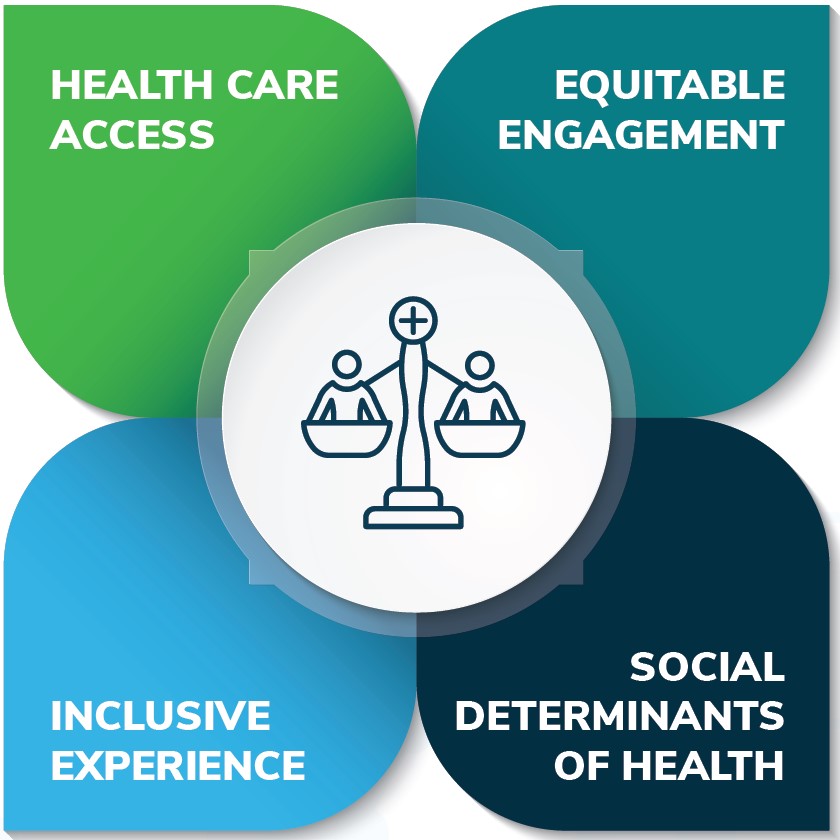October 31, 2023
Health equity is achieved when everyone has the opportunity to reach their full health potential regardless of demographic, social and geographical differences.1 Across the globe, many populations experience health disparities. The root cause of these inequities is social determinants of health (SDOH), the conditions in which people are born, grow, live, work and age that influence their health and well-being.
Business Case for Prioritizing Health Equity

Employer Strategies to Advance Health Equity
Employers can play a significant role in achieving greater health equity for their employees and the communities where they live around the world by addressing social determinants; providing access to high-quality, affordable care; enabling engagement in health and well-being benefits; and prioritizing cultural consciousness and inclusivity throughout the benefits, health care and work experience.
Health Care Access Through Employer/ Supplemental Insurance
- Increase access to high-quality, affordable physical and mental health care.
- Collaborate with plans, providers, community organizations, and where appropriate, government health care systems, to align incentives, coverage and payment with health equity outcomes.

Equitable Engagement
- Enable employees and their family members to find, understand and engage in benefits that support their health and well-being.
- Use trusted communication sources and context appropriate for people experiencing inequities.
- Partner with ERGs to improve benefits and engagement.
Inclusive Experience
- Prioritize diversity, equity, inclusion & belonging (DEIB) principles and practices throughout the organization.
- Understand DEIB priorities and challenges across different countries and cultures and proactively work to translate and advance the company’s commitments within local contexts.
- Ensure employees have access to and can easily find culturally relevant care.
Social Determinants of Health
- Identify employees' social needs.
- Connect employees with community resources that address unmet life needs.
- Fill gaps through benefits, programs and policies.
- Advocate for and partner strategically to improve community health and sustainability locally and globally.
How the Business Group Can Help
Achieving health equity will require strategic alignment across employers, health plans, providers, public health agencies and community organizations. Business Group on Health convenes leaders across industries and across the globe to explore tangible actions that can be taken to drive change together, and ultimately, achieve health equity.
Related Business Group on Health Resources
- Employer Guide to Health Equity
- Social Determinants: Acting to Achieve Well-being for All
- Become an Employer of Choice: Prioritizing Women’s Health in Global Benefits Design
- A Closer Look at the Evolution of Inclusive and Equitable Transgender Benefits and Policies
- Disability Inclusion in Health and Well-being
- Centering our Conversation about Quality Through a Health Equity Lens

Health Equity: Employer Role in Driving Change Globally
More Topics
Articles & Guides- 1 | World Health Organization. Health equity. 2023. Available at: https://www.who.int/health-topics/health-equity.
-
IntroductionEmployer Guide to Health Equity
-
Full GuideEmployer Guide to Health Equity: Full Guide
-
Executive SummaryEmployer Guide to Health Equity Executive Summary
-
InfographicHealth Equity: Employer Role in Driving Change Globally
-
Part 1Health Care Access
-
Part 2Inclusive Experience
-
Part 3Equitable Engagement
-
Part 4Social Determinants of Health
